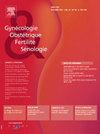Évaluation de l’anxiété et la dépression chez les femmes enceintes hospitalisées à domicile en cours de grossesse
IF 0.8
4区 医学
Q4 OBSTETRICS & GYNECOLOGY
引用次数: 0
Abstract
Objective
This study aims to identify factors associated with depressive and anxious symptomatology in pregnant women hospitalized during the antepartum period in home care management (Hospitalisation à domicile).
Method
This is a quantitative, single-center, observational, and descriptive study that included all French-speaking women hospitalized in the HAD of AP–HP between September 2022 and February 2023. Anxious and depressive symptoms were assessed using the self-administered HADS (Hospital Anxiety and Depression Scale) questionnaire. Analyses were conducted according to two distinct groups, comparing patients with an anxiety or depression scores below 8 on the HADS to those with a score of 8 or above (the threshold set on the questionnaire corresponding to intermediate symptomatology). A second questionnaire created for the study detailed maternal history, pregnancy experience, and lifestyle.
Results
A total of sixty-four women were included from September 20, 2022, to February 15, 2023. Eighteen women (28%) evaluated had anxious symptomatology and thirteen women (20%) had depressive symptomatology. Factors significantly associated with anxiety were poor pregnancy experience (P = 0.04), the need for psychological follow-up during pregnancy (P < 0.01), country of birth (P = 0.022), as well as psychiatric history such as previous consultations with a mental health specialist (P = 0.015) and previous psychotropic treatment (P = 0.028). Additionally, a history of violence (respectively, P = 0.034 and P < 0.01) and the women's belief that a consultation with a psychologist would benefit them were also associated with anxious and depressive symptomatology (respectively, P < 0.01 and P < 0.01)
Conclusion
Our results highlight the importance and necessity of enhancing the screening and prevention of various mental disorders during pregnancy. It would be interesting to implement organized screening for anxiety, similar to depression, in pregnant women hospitalized at home and for the entire obstetric population.
[家庭护理管理中孕妇焦虑和抑郁的评估]。
目的:本研究旨在确定家庭护理管理(住家)产前住院孕妇抑郁和焦虑症状的相关因素。方法:这是一项定量、单中心、观察性和描述性研究,纳入了2022年9月至2023年2月期间因AP-HP HAD住院的所有法语女性。焦虑和抑郁症状评估使用自我管理的HADS(医院焦虑和抑郁量表)问卷。根据两个不同的组进行分析,将HADS得分低于8分的焦虑或抑郁患者与得分为8分或以上的患者进行比较(调查问卷上设定的阈值与中级症状相对应)。第二份调查问卷详细说明了母亲的历史、怀孕经历和生活方式。结果:从2022年9月20日至2023年2月15日,共纳入64名女性。18名女性(28%)有焦虑症状,13名女性(20%)有抑郁症状。与焦虑显著相关的因素是孕期经历不佳(p = 0.04)、孕期需要心理随访(p = 0.04)
本文章由计算机程序翻译,如有差异,请以英文原文为准。
求助全文
约1分钟内获得全文
求助全文
来源期刊

Gynecologie Obstetrique Fertilite & Senologie
Medicine-Obstetrics and Gynecology
CiteScore
1.70
自引率
0.00%
发文量
170
期刊介绍:
Gynécologie Obstétrique Fertilité & Sénologie est un mensuel scientifique d''information et de formation destiné aux gynécologues, aux obstétriciens, aux sénologues et aux biologistes de la reproduction. La revue, dans ses éditoriaux, articles originaux, mises au point, lettres à la rédaction et autres rubriques, donne une information actualisée ayant trait à l''obstétrique et à la gynécologie et aux différentes spécialités développées à partir de ces deux pôles : médecine de la reproduction, médecine maternelle et fœtale, périnatalité, endocrinologie, chirurgie gynécologique, cancérologie pelvienne, sénologie, sexualité, psychosomatique…
 求助内容:
求助内容: 应助结果提醒方式:
应助结果提醒方式:


